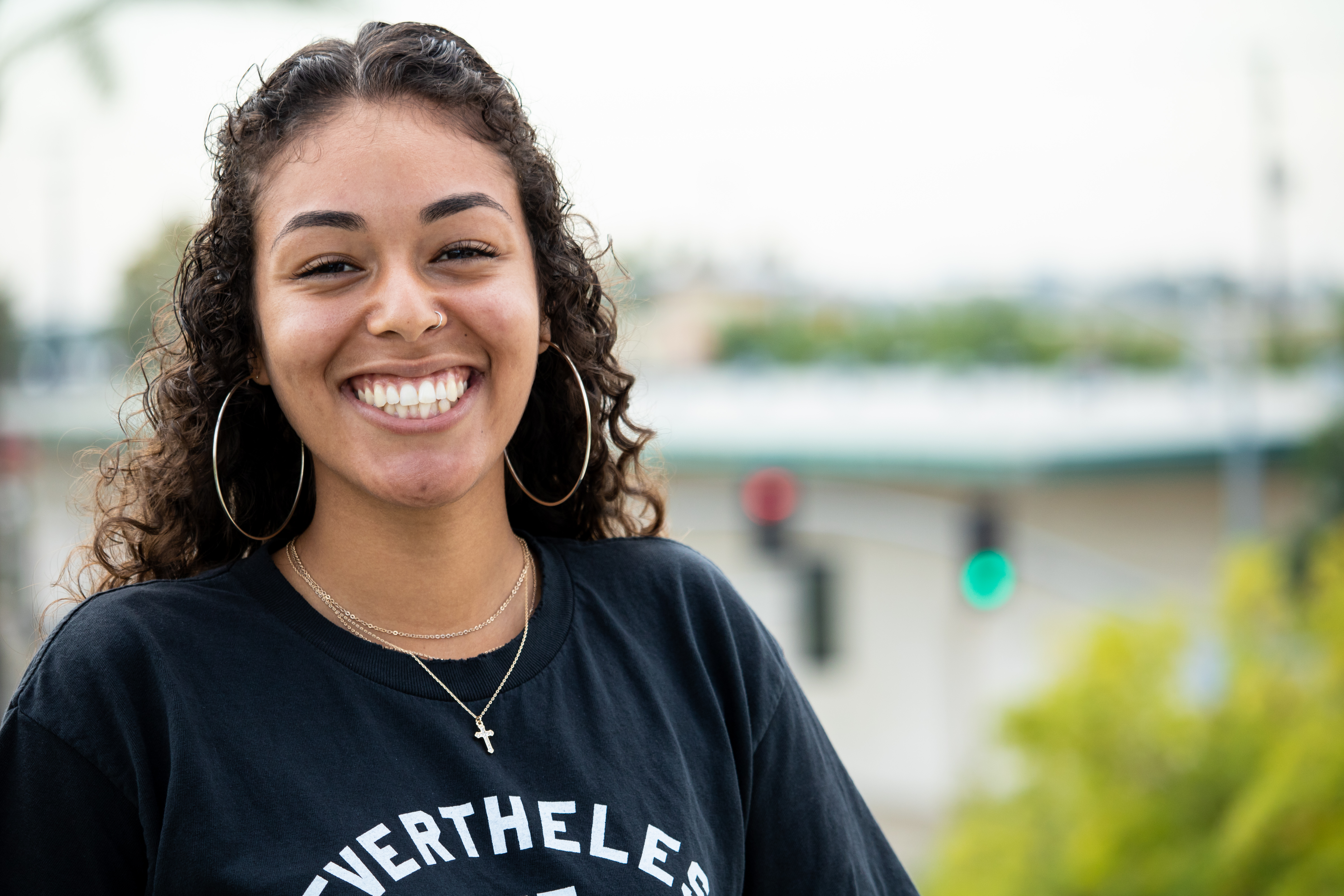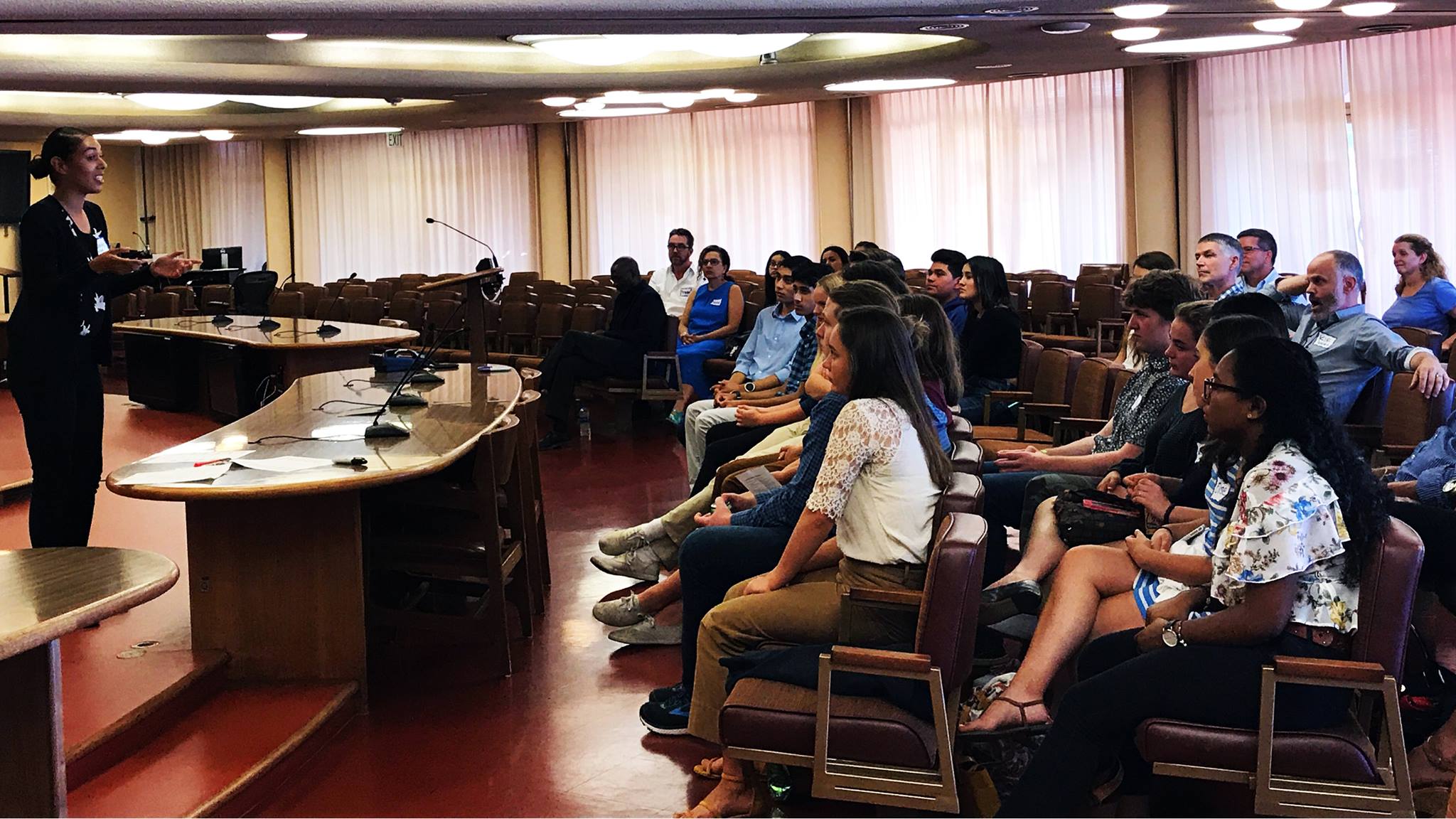My name is Wendy Pacheco and I value self-love, empowerment and liberation for myself and all others. Before coming to yli I wasn’t clear on my values, because I hadn’t sat down to really think about it. Working at yli, my first job post-college, has pushed me to name and embody my values in a lot of ways. But I have also become jaded about the nonprofit world and what it means to work on “the inside.”

Everybody who knows me knows that I come from East LA. It’s in the way that I speak, it’s in the way that I dress, it’s in the way that I move. It’s everything about me. For a long time, I was ashamed of that. Growing up in East LA came with its own set of challenges. My family was impacted by the War on Drugs in the 90’s and it left a long-lasting impact on our family and in our community. My goal growing up was to get out. The narrative I and many other young people were sold was if we avoided teenage pregnancy and studied hard enough we could get out of the hood and build a better life for ourselves. In retrospect, the goal should never have been to leave my community but instead to build in my community.
When I came to the Bay Area, it was more diverse than I was used to. I found a home in UC Berkeley’s Ethnic Studies Department – I found a lot of answers there about the conditions in which I grew up. I learned about policies and laws that were designed to uphold white supremacy. I learned that the legacy of colonialism could be traced through my bloodline and to the direct violence and suffering that my ancestors experienced. When I graduated, I decided that I did not want to work with white people. There were so many wounds in my own community and in myself that needed attention – many of which were caused by white supremacy. I felt so angry and triggered – like I was being hurt by white folks every which way I turned. I had zero capacity to try to change their hearts and minds, or to tear down the harmful systems that they had created. Instead, I wanted to invest my energy in building a new future for folks of color.
When I started working at yli’s Marin office, I was wholly unprepared to work in a predominantly white community. I had been drawn to work at yli because I wanted to do advocacy work with a youth lens. But the first day I stepped out in front of my young folks, what I saw staring back at me was a room full of white people. I realized very quickly that my leadership, the way I was entering the space, didn’t align with the folks I had in front of me. So I had to change my strategies – the way I invested in and talked about social justice could not be based on shared experience because I thought I had very little in common with these students.
Working alongside young white people, I discovered that we did, in fact, have some experiences in common: incarceration, foster care, addiction. These youth didn’t look like me, but carried the same weight that I carry everyday. I wanted to give my full self to these young people. I didn’t want to perpetuate harm – my healing journey couldn’t be about marginalizing other people. I began to realize that my job is to make sure that everyone has a voice and everyone deserves a safe space where they feel seen. Nonetheless, I still have the responsibility of educating students about the injustices that exist in this world, starting with racism.

So what does it look like to have this conversation in a way that doesn’t silence young people, that opens up a space for us to work through this together? I’m still learning how to work with these youth in a way that is authentic to my experience, that lifts up the voices of people who have been historically marginalized. Looking back, I believe that working in Marin was a sign from the universe. It was a push for me to let go of my trauma as my identity and purpose and to redefine what my leadership looks like.
I’ve been here for 3 years and it’s still difficult. Young people of color really struggle here. As a young professional of color, I remember being embarrassed about how I spoke, about how I dressed – and I already had the skills to cope with these feelings, or so I thought. I think about the young folks of color who grow up here, who, as early as 6 years old have to face racism in a way that I never had to face it, because I grew up in a community where everyone looked like me.
Working in a predominantly white community has also meant that I have to move in a certain way. When I first came to yli, I was encouraged to talk about race and racism. My supervisor and CEO – both of whom were white – reassured me over and over again that my job would not be compromised if I spoke out about racial inequities. Partners sought me out, invited me to meetings, but as the only person of color in the room, it felt tokenizing.
These well-intentioned white people didn’t really understand the sense of risk I experienced in speaking up. My anxiety about speaking at board meetings and in front of partners about racism and equity was astronomical. Would these folks see me in a different way? In my programs, I was terrified to get that parent call that would put my job in jeopardy if I dared to mention white privilege. And then I would punish myself for not stepping up more.
Privilege creates a profound sense of safety – about one’s position, livelihood, even one’s ability to simply exist in the world without being harassed or killed. As a person who has searched for stability all my life, I have struggled to use my voice in a way that feels authentic and that doesn’t entail deep emotional consequences.
Creating the Marin Organizing for Racial Equity (M.O.R.E) has been the tipping point for me. I’ve been able to connect with mentors and organizations of color – I don’t feel like I’m doing this work all by myself – and I’m beginning to see our work flourish. A few weeks ago at our kickoff event, I was able to say, out loud, for the first time, that I’m uncomfortable working here in Marin as a professional of color. Standing on stage beside my youth of color, with yli’s new CEO, who is also a person of color, looking up at me from the audience, I finally felt like I wasn’t going to get in trouble for telling my truth, that people would listen and care about my experience – and, more importantly, the experiences of youth of color in Marin.

There are ways that I feel challenged by working inside the nonprofit industrial complex. yli is a business, which sometimes runs at the expense of the folks we’re trying to serve. Many of the radical ideals I gained during my time in UC Berkeley’s Ethnic Studies Department aren’t reflected in the work. Our programs are dictated by funders, which restricts what we can do. So we’ve had to be creative about how to build our youths’ political consciousness about root causes and oppressive systems – like homophobia, racism, and classism – even as we work to get the contracted deliverables completed. Faced with these restrictions, we have to hang onto the little ways we can embody our values and tear down the status quo.
I’ve also been inspired by other staff on our team. Montze, Program Manager in the Long Beach office, is a great example of a person who always moves with her values at the center. She led in creating yli’s first Advisory Committee, which is tasked with ensuring that our work aligns with our values. She has worked hard to give this committee life – to make sure it has real teeth and power. In all spaces, she is relentless in holding people accountable about equity within our organization. She never shies away from asking the uncomfortable question, from forcing us to sit through the discomfort. Her endurance and resilience is critical, since wearing people down is another tactic people in power use as a method of control. This a huge burden that often falls to those who are most impacted.
Reconciling my radical values with the nonprofit world I’m living in right now has been a point of contention for me.
I’ve worked so hard all my life to attain some level of stability, and now that I’ve achieved it, I worry that I’ve gotten too comfortable. At the same time, I try and give myself grace and compassion. Growing up was a fight for me and survival oftentimes meant silencing myself. So as I work at yli to empower youth to use their voice, I am in that same journey with them. For the time being, I’ve decided to focus on investing in my youth and on my own self-care and healing: having fun, participating in a reading group, playing soft ball. Self-care and centering joy is a radical act for those of us who have been in the struggle from day one.
This post is the fifth in our series, “Is yli Radical Enough?” At yli, we have strong opinions about what social justice looks like…but are we truly living our values? We have the power to be intentional about our work community and model what it looks like for an organization to work at self-reflection and improvement. This is an attempt to be vulnerable and transparent about our process of growth as individuals, as a collective, and as youth advocates.
